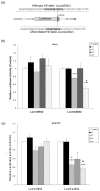Allele-specific silencing of mutant Huntington's disease gene
- PMID: 19094060
- PMCID: PMC3166352
- DOI: 10.1111/j.1471-4159.2008.05734.x
Allele-specific silencing of mutant Huntington's disease gene
Abstract
Huntington's disease (HD) is an autosomal-dominant neurodegenerative disorder caused by a poly-glutamine expansion in huntingtin, the protein encoded by the HD gene. PolyQ-expanded huntingtin is toxic to neurons, especially the medium spiny neurons of the striatum. At the same time, wild-type huntingtin has important - indeed essential - protective functions. Any effective molecular therapy must preserve the expression of wild-type huntingtin, while silencing the mutant allele. We hypothesized that an appropriate siRNA molecule would display the requisite specificity and efficacy. As RNA interference is incapable of distinguishing among alleles with varying numbers of CAG (glutamine) codons, another strategy is needed. We used HD fibroblasts in which the pathogenic mutation is linked to a polymorphic site: the Delta2642 deletion of one of four tandem GAG triplets. We silenced expression of the harmful Delta2642-marked polyQ-expanded huntingtin without compromising synthesis of its wild-type counterpart. Following this success in HD fibroblasts, we obtained similar results with neuroblastoma cells expressing both wild-type and mutant HD genes. As opposed to the effect of depleting wild-type huntingtin, specifically silencing the mutant species actually lowered caspase-3 activation and protected HD cells under stress conditions. These findings have therapeutic implications not only for HD, but also for other autosomal dominant diseases. This approach has great promise: it may lead to personalized genetic therapy, a holy grail in contemporary medicine.
Figures




References
-
- Abdelgany A, Wood M, Beeson D. Allele-specific silencing of a pathogenic mutant acetylcholine receptor subunit by RNA interference. Hum Mol Genet. 2003;12:2637–2644. - PubMed
-
- Almqvist E, Spence N, Nichol K, Andrew SE, Vesa J, Peltonen L, Anvret M, Goto J, Kanazawa I, Goldberg YP, et al. Ancestral differences in the distribution of the delta 2642 glutamic acid polymorphism is associated with varying CAG repeat lengths on normal chromosomes: insights into the genetic evolution of Huntington disease. Hum Mol Genet. 1995;4:207–214. - PubMed
-
- Ambrose CM, Duyao MP, Barnes G, Bates GP, Lin CS, Srinidhi J, Baxendale S, Hummerich H, Lehrach H, Altherr M, et al. Structure and expression of the Huntington’s disease gene: evidence against simple inactivation due to an expanded CAG repeat. Somat Cell Mol Genet. 1994;20:27–38. - PubMed
-
- Cattaneo E, Zuccato C, Tartari M. Normal huntingtin function: an alternative approach to Huntington’s disease. Nat Rev Neurosci. 2005;6:919–930. - PubMed
-
- Difiglia M, Sena-Esteves M, Chase K, Sapp E, Pfister E, Sass M, Yoder J, Reeves P, Pandey RK, Rajeev KG, Manoharan M, Sah DW, Zamore PD, Aronin N. Therapeutic silencing of mutant huntingtin with siRNA attenuates striatal and cortical neuropathology and behavioral deficits. Proc Natl Acad Sci U S A. 2007;104:17204–17209. - PMC - PubMed
Publication types
MeSH terms
Substances
Grants and funding
LinkOut - more resources
Full Text Sources
Other Literature Sources
Research Materials

